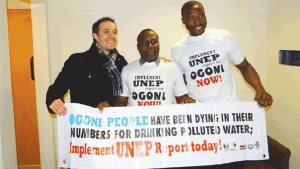Senior Correspondent, ISHAYA IBRAHIM, reports on the anger by activists in Nigeria and abroad over perceived Shell’s slow response to the 2011 UNEP report which indicted it for polluting Ogoniland
Akpobari (middle), Shola Ameobi (right) and Patrick Kane at London, protesting Shell’s neglect of Ogoniland. Akpobari (inset) showing the impact of oil spillage.
At the annual general meeting of Royal Dutch Shell recently at The Hague, The Netherlands, James Marriott, an advocate for environmental justice, asked the organisation’s Chief Executive Officer, Ben Van Beurden, a punchy question: if the pollution in Ogoniland had happened in Europe, would the company ignore it?
United Nations Environmental Programme (UNEP) had, in a report on August 4, 2011, indicted Shell Petroleum Development Company (SPDC), an international oil giant, for the pollution of Ogoniland. The report thus concluded that if contaminated drinking water, land, creeks and ecosystems such as mangroves are to be brought back to full productive health in the area, the Nigerian government, and also Shell, whose oil exploration activities caused the pollution, must commit $1 billion (about N160 billion) for a clean-up of the environment.
But Beurden, while responding to Marriot’s question, said the $1 billion to implement the clean-up as recommended by UNEP, has been set aside in a “verifiable” account. He added that the company was unable to disburse the funds due to “lack of structures” to receive the money and coordinate the clean-up in Nigeria.
This response from the Shell’s boss has infuriated activists from the region, especially in Ogoniland, among whom is the national coordinator of the Ogoni Solidarity Forum, Celestine Akpobari, who just returned from London where he attended a social action campaign on the UNEP report, with Super Eagles international football striker, Shola Ameobi, and Patrick Kane, an activist.
Akpobari said: “Shell has the power to do anything it wants in Nigeria, including having our people killed as it had done in the past. But are we expected to believe that it does not have the power to arrange for the clean-up of its own mess? These are double standards and lies. How many more years will the Ogoni people have to wait for something to be done about their toxic environment?”
Another activist at the event, Sarah Shoraka, who works for Platform, said: “Shell claims it needs to wait for the Nigerian government to act, but everyone knows they are in the driving seat. The Petroleum Minister was the Director of Shell Nigeria for 15 years. Ben Van Beurden says he is travelling to Nigeria in the next two weeks. He needs to get his head together with the Nigerian government to set up Ogoni Environment Restoration Authority, if he is serious about delivering the clean-up.”
For Kane, Shell’s reason on why the clean-up has been stalled is offensive. “It is frankly offensive for Shell to claim that it has the money sitting there, but is hanging on for the structures to emerge in Nigeria. Shell is guilty of over half a century of destruction of the Ogoni environment. It has a duty to make this clean-up happen as soon as possible.”
Another environmental activist at the event, Nnimmo Bassey, who is also the Director, Health of Mother Earth Foundation, said: “We are surprised that it took Shell so long to indicate readiness to provide first instalment towards the clean-up of Ogoniland. As the polluter, Shell has no right to dictate what sort of account should be created for the clean-up of their massive ecological destruction of Ogoniland. The survivors of the ecological war against the Ogonis must be directly involved in the planning of the clean-up and in the management of the funds assigned for the purpose.”
Earlier, the Ogoni Solidarity Forum had threatened that if the federal government failed to compel Shell to begin the clean-up on their land before August 4, which would mark the third anniversary of the UNEP report, it would disrupt oil production in the country.
“August 4 is the third anniversary of the release of that report, and if they have not started implementing the UNEP report before that day, there will be no oil export in this country again. Don’t forget that all the oil produced in the Niger Delta pass through Ogoni to Bonny for export. We will take over the pipeline. There will be no export. They (federal government) should be prepared to dig mass grave to bury everybody. We have decided and that is the way it is going to be,” Akpobari had said.













